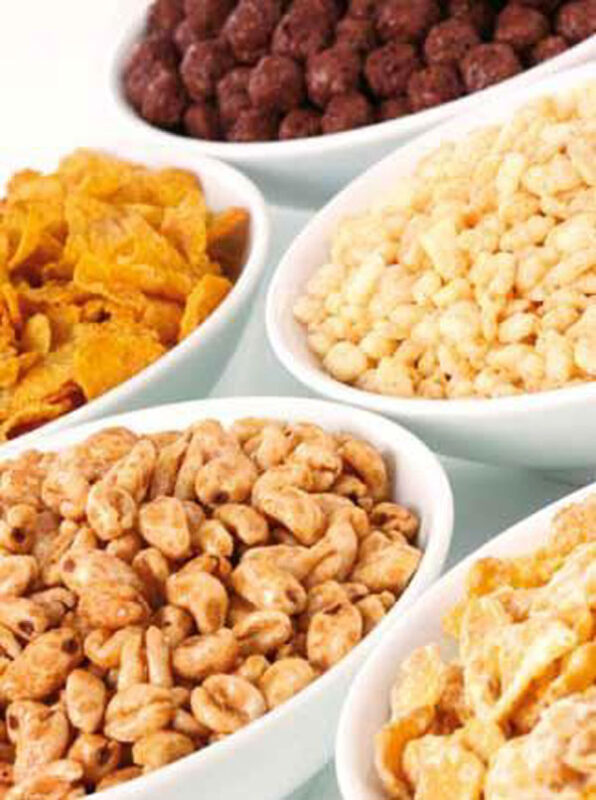NUTRITION
Carbohydrates in your diet
- Key Messages
- Benefits of Eating Well
- Energy Demands
- Carbohydrates
- Protein Needs
- Vitamins
- Hydration
- Special Needs of Players

Breakfast cereals are good.
Carbohydrate is an important fuel for exercise but the body can store enough to last for only one day of hard training. The player’s everyday eating and drinking plan therefore needs to provide enough carbohydrate to fuel their training program and to optimize the recovery of muscle glycogen stores between workouts. General targets can be provided for carbohydrate needs, based on the player’s size and the demands of their training program (see Table below). Actual needs are specific to the individual, however, and must be fine-tuned to take account of the total energy needs and specific training goals. It is important to get feedback from your Go-Pro Sports Football Academy Dubai performance in training and match play to assess whether there is a problem with fuel availability. An inadequate carbohydrate intake will lead to early fatigue.
Targets for carbohydrate intake
• Immediate recovery after exercise (0-4 hours):
about 1 g per kg of the player’s body weight per hour,consumed at frequent intervals.
• Daily recovery from a moderate duration/low intensitytraining session:
5-7 g per kg BW per day.
• Recovery from moderate-heavy endurance training(such as pre-season) or fueling up for a match: 7-10 gper kg BW per day.
Strategies for choosing carbohydrate foods and drinks and optimizing recovery of glycogen stores
When the period between training sessions is less than about 8 hours (as in pre-season for elite players), carbohydrate intake, in the form of solids or liquids, should start as soon as practicable after the first session to maximize the effective recovery time. There may be some advantages in meeting carbohydrate targets through a series of snacks during the early recovery phase.
During longer recovery periods (24 hours), the pattern and timing of carbohydrate-rich meals and snacks do not appear to be critical, and can be organized according to what is practical and comfortable for each player. There is no difference in glycogen synthesis when carbohydrate is consumed in liquid form or as solid foods. Given the amount of carbohydrate to be consumed, high carbohydrates foods will need to be spread out over the full 24 hours.
It is valuable to choose nutrient-rich carbohydrates and to add other foods to recovery meals and snacks to provide protein and other nutrients. These nutrients may assist in other recovery processes, and in the case of protein, may promote additional glycogen recovery when carbohydrate intake is below targets or when frequent snacking is not possible.
Carbohydrate-rich foods and drinks with a moderate to high glycaemic index (GI) provide a readily available source of carbohydrate for glycogen synthesis. These foods should form the major part of recovery meals.
Adequate energy intake is also important for optimal glycogen recovery; the restrained eating practices of some players, particularly females, make it difficult to meet carbohydrate intake targets and to optimize glycogen storage from this intake.
Similar strategies apply to recovery after games. This can be especially challenging after matches that finish late in the evening, with further complications if there is a homeward journey beginning immediately after the match. Neglecting an adequate carbohydrate intake after the game will delay recovery and it is important that some carbohydrate is consumed before setting off on the journey home and before going to bed.
Special comments
Guidelines for carbohydrate should not be provided in terms of percentage contributions to total dietary energy intake (for example, stating that carbohydrate should provide 55% of energy intake). Such recommendations are hard for most people to follow since they require both carbohydrate and energy intake to be tracked. They can also be misleading when energy intakes are particularly high or particularly low.
Examples of carbohydrate foods with moderate- high Glycaemic Index:
Most breakfast cereals Most forms of rice White and brown breads.
Sports drinks and soft drinks Sugar, jam and honey Potatoes.
Tropical fruits and juices.
Examples of nutrient-rich carbohydrate foods and meal combinations
Breakfast cereal with milk Flavoured yoghurt.
Fruit smoothie or liquid meal supplement Sandwich with meat and salad filling.
Stir-fry with rice or noodles.
Carbohydrate is an important fuel for exercise but the body can store enough to last for only one day of hard training.

